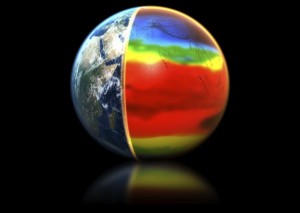Health Effects of Global Warming
 As I write this column, Connecticut has received its third dusting of snow. By the end of January, we should have had several large snowstorms dumping 6 to 18 inches each. However, instead we had record-breaking warm temperatures until the second week of January, with the longest number of days without snow and warmer than 32 degrees Fahrenheit since records have been kept. The University of New Hampshire completed an assessment of Global Climate Change Indicators in 2005, stating that northern New England has seen an average increase of eight days to its growing season, fewer days of solid ice cover on lakes and fewer days of frost. The 10 hottest years on record (global land, sea and air averages) have occurred in the last 25 years. The year 2006 was named the hottest year on record in the U.S., and likely will be named the third hottest year on Earth since records have been kept.
As I write this column, Connecticut has received its third dusting of snow. By the end of January, we should have had several large snowstorms dumping 6 to 18 inches each. However, instead we had record-breaking warm temperatures until the second week of January, with the longest number of days without snow and warmer than 32 degrees Fahrenheit since records have been kept. The University of New Hampshire completed an assessment of Global Climate Change Indicators in 2005, stating that northern New England has seen an average increase of eight days to its growing season, fewer days of solid ice cover on lakes and fewer days of frost. The 10 hottest years on record (global land, sea and air averages) have occurred in the last 25 years. The year 2006 was named the hottest year on record in the U.S., and likely will be named the third hottest year on Earth since records have been kept.
This may seem like a blessing for those who hate shoveling, skiing, sledding or frozen appendages. But what are the larger health implications of global warming?
In the next three editions of the Green Corner, I will elaborate. My enthusiasm for this topic was initially kindled in 1988 when I heard Al Gore speak at my college. Most recently, I was selected to be trained by Al Gore to present his slide show on global warming as part of TheClimateProject.org. You might say my enthusiasm these days is at a fever pitch! (Sorry.)
The Science of Global Warming
Although the stereotype of a naturopathic physician is one of Birkenstocks, peace signs and awareness of all left-leaning political issues, it is still quite possible some of you have not heard of global warming. Here is a synopsis of the science.
Arctic and Antarctic ice cores contain records of atmospheric CO2 levels dating back 600,000 years. Scientists analyzing the ratio of gasses trapped in the ice can determine the age, temperature and CO2 content of the snow that fell during that period. The pattern they see is that when CO2 levels increase, the temperature always increases. The difference between an Ice Age (180 ppm) and a comfortable temperature for humans (280 ppm) is only 100 ppm of CO2 (Petit et al., 1999; Spahni et al., 2005). At no time in the past 600,000 years has the concentration of CO2 been higher than 280 ppm. Currently, atmospheric CO2 is 380 ppm. We have no reference point for what the temperatures will increase to at this level. If we continue with business as usual, in 40 years the CO2 concentration will reach more than 600 ppm.
Many other studies (more than 14,000, actually) are almost all in agreement that human activity is the cause of this increase. In fact, a statistical sampling of these studies (n=928) showed complete agreement (Oreskes, 2004). A recent United Nations paper contained a consensus statement by 1,000 of the leading climate scientists worldwide who had worked on this topic for the last 20 years. They unanimously stated that the globe is warming, and the burning of fossil fuels (coal, oil and natural gas) is the major cause of this effect (Intergovernmental Panel on Climate Change, 2007).
Next issue’s column will look at the extent that this rise in CO2 levels and increase in temperature is causing weather events around the world and how that affects the health of specific populations.
Mitch Kennedy, ND has a family practice in Avon, CT, and is the first ND with clinical privileges at the University of Connecticut, a teaching hospital. Before graduation from Southwest College, Kennedy earned an international reputation as a leader in pollution prevention, showing industries around the world how preventing pollution saves money. For more information: www.healwithnature.com.
References
Petit JR et al.: Climate and atmospheric history of the past 420,000 years from the Vostok ice core, Antarctica, Nature 399:429-436, 1999.
Spahni R et al.: Stable carbon cycle-climate relationship during the Late Pleisto-cene, Science 310(5752):1313-1317, Nov 2005.
Oreskes N: The scientific consensus on climate change, Science Dec3, 306 (5702): 1686, 2004.
Intergovernmental Panel on Climate Change: The physical science basis of climate change, February, 2007, www.ipcc.ch








